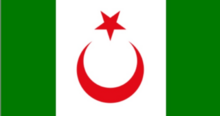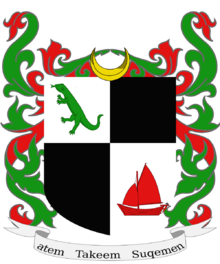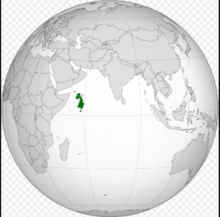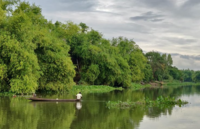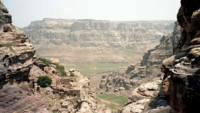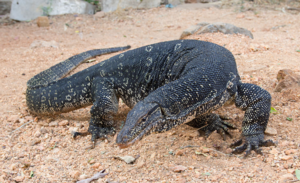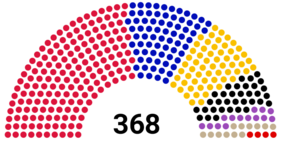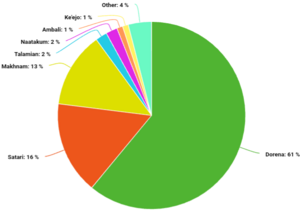Daqaan
Dakan (Dorena: Daqaan: [Dæqa:n], officially the Democratic Republic of Dakan, is a country located in the Arabian Sea, approximately 300 miles from the coast of Somalia across the Sokut Sea. It covers an area of 206,000km² making it the 8th largest island nation, and has a population of 14.4 million. Although officially transcontinental between Asia and Africa, Dakan is generally considered to be an African country. The capital is Saaman although the largest city is Ajaan. Other major cities include Meejak, Kxabar and Zadura. As well as the main island of Dakan, the nation also controls the neighbouring islands of Xaria, Ambali and Soqutra which was brought under Dakani administration in 1824. The country's official language is Dorena, often referred to as Dakani.
Democratic Republic of Dakan Kxamal Daqaan Ankemaj | |
|---|---|
| Motto: "Xatem -Takeen -Suqemena" (French) "Peace – Work – Fatherland" | |
| Capital and largest city | Saaman |
| Official languages | |
| Recognised national languages | |
| Ethnic groups | |
| Demonym(s) | Dakani |
| Government | Republic |
| Ibraam Jamuur | |
| Legislature | National Assembly |
| Regional Representative Council | |
| House of People's Representatives | |
| Formation | |
• Declared | 1 January 1745 |
• Annexation of Makhnama | 1 October 1833 |
| Area | |
• Total | 206,000 km2 (80,000 sq mi) (5th) |
• Water (%) | 5.3 |
| Population | |
• July 2018 estimate | 14,429,878 (8th) |
• 2012 census | 14,063,836 |
• Density | 68.2/km2 (176.6/sq mi) (193rd) |
| GDP (PPP) | 2017 estimate |
• Total | $620 billion |
• Per capita | $21,421 (14th) |
| GDP (nominal) | 2017 estimate |
• Total | $25.759 billion |
| Gini (2018) | medium |
| HDI (2017) | high (20th) |
| Currency | Dakani Kaal (₭) (DKK) |
| Time zone | UTC+4 (GST) |
• Summer (DST) | UTC+4 (not observed) |
| Driving side | right |
| Calling code | +038 |
| Internet TLD | .dq |
Etymology
One of Dakan's original inhabitants, the Naatakum, referred to the island now known as Dakan as 'Klẹ' meaning land. However, the roots of Dakan's current name, known as Daqaan in Dorena, originates from the ancient Dorena phrase 'Dhali Qaan' meaning red light, referring to the red colour of the landscape in the deserts of northern Dakan. in the 9th century, the name came to refer to the Dorena and Satari people in the region and the Dakani name Daqaan was used when the country unified in 1745. Many Makhnam people consider themselves to not be Dakani, as the Makhnam region was not historically included as part of the region known as Dakan.
History
Early History
Early inhabitants of the region now known as Dakan include the hunter gatherer Qa and Naatakum peoples, who are thought to have arrived from what is now the southern regions of the Arabian Federation nearly 250,000 years ago. However, in the 6th century, proto-Dorena peoples migrated to Dakan from Puntland in Somalia. After 100 years, Dorena peoples became the island's dominant ethnolinguistic group. Dakan has long been an important destination for trade in the Indian Ocean and has been influenced by merchants from Zanzibar, Arabia and further afield to Malaysia and Indonesia. The proto-Dorena diverged into two main groups, the Dorena and Satari, with the Satari concentrated in what is now the Ajaan and Jakan regions. Various Dorena kingdoms such as the Teme and Jlokon ruled various parts of the region. Teme reached its peak in 1325 under Mekhol then gradually declined. It was finally defeated in 1456 in the Teme-Asali war. The Asali were a Satari kingdom, and was very successful in exerting its influence over the region. It controlled almost all of what is now Dakan and even the regions of Somalia and southern Arabia. It reached its peak in 1530 and finally collapsed in 1703.
Classical Islamic Era
The main religion in Dakan is Sunni Islam and this has been dominant since the arrival of Dorena and Satari peoples. However, in 1390, king Omena, who ruled in the east of Dakan, founded the Makhnam kingdom as well as the Makhnam religious sect. The Makhnam people, although part of the Asali kingdom and briefly the Teme Kingdom, retained their individual identity. After the collapse of Asali, the Makhnam kingdom was reinstated. It continued as an independent state until it was seized and annexed as part of Dakan in 1833, bringing the entire island under one government for the first time.
There has been longstanding tensions between followers of Sunni Islam (majority Dorena and Satari) and the Makhnam sect. This came to a head in 1886 when the Khabur rebellion sparked a the beginning of the Makhnam-Dakan war, with rebellion leaders proclaiming an independent Makhnam state. The Makhnam was defeated after 2 years. There were later rebellions in 1899 and 1948. Over 50,000 Makhnam civillians were killed by the Dakani government and this led to international sanctions. The sanctions played a part in the overthrow of the government.
Colonial and Early Modern Era
Contemporary Era
Dakan adopted a new constitution in 1963 under prime minister Kajiil Muzaxa, with a more inclusive ideology and the creation of autonomous Makhnam regions. In the last 40 years, Dakan has become a more democratic country, including the election of Hamad Nawab who is Makhnam. It became a member of the African Union in 1966 and has been classed as a newly industrialised nation.
Geography
Dakan lies on the Somali tectonic plate, between latitudes 2°N and 12°N, and longitudes 53°E and 56°E. The nearest neighbouring mainland state to the west is Somalia and Yemen to the North. Dakan consists mostly of desert and flat plains especially in the northern Daran region, rising to 2,082 metres (6,831 feet) on the largest mountain, Kaajez. The southern regions of the country are more heavily forested and contain the majority of Dakan's arable land.
The largest river in Dakan is the Ajlaqenaa river which flows through much of Dakan's southern areas. The country also has several small lakes, mostly in the Tiiqa region. Dakan is rich in minerals such as copper, graphite and silica.
Flora and Fauna
The national animal of Dakan is the Monitor Lizard, which is common in the country. Due to being isolated from the African continent for nearly 100 million years, Dakan contains many endemic species of animalThe national tree of Dakan the Blackthorn, which is often used in traditional medicine. Forest cover dropped from 26% to 11% in the 20th century, leading to the extinction of many species. However, since 1998 logging has been banned and the government is making and effort to preserve the forests.
Climate
The climate of Dakan is predominantly semi-arid desert. This is characterised by sometimes extremely hot summers and minimal precipitation. However, the more arable southern regions of the country experience slightly cooler weather and more rain, especially in the months of September and October. Dakan is also prone to cyclones, with cyclone Gonu in 2007 being the nation's most devastating to date, causing at least 285 deaths and ₭9.4 billion ($2.3 billion US dollars) in damage costs.
Government and Politics
Dakan has been a democratic republic since 1963, before which it was known simply as the Republic of Dakan and was an authoritarian dictatorship. Dakan is a unitary state with a multiparty parliamentary system.
The Dakani National Assembly is bicameral, and consists of the lower House of People's Representatives (HPR) with 368 members, and the upper Regional Representative Council (RRC) with 104 members. The HPR is elected in multi member constituencies. The RRC is also elected by region, however its members are not permitted to have party affiliation.
The Dakani constitution, founded in 1963, has 131 articles and has been amended 34 times. To be amended, the constitution needs 60% support in the House of People's Representatives and 50% support from both the Regional Representative Council and the public in a nationwide referendum which requires over 60% turnout.
Dakan received a score of 6.10 on the 2021 Democracy Index, making it a flawed democracy and the 4th most democratic country in Sub-Saharan Africa.
Politics
The current political culture in Dakan is a contest between the left wing Nation Party, the more right wing Solidarity and People's Democratic Parties and the regionalist Makhnam People's Front. For the past 2 elections, the Nation Party has been dominant and is currently the governing party. As of 2019, there are 58 registered parties in Dakan.
|
[[Image: .svg|240px]] Nation Party: 172 seats Solidarity Party: 72 seats People's Democratic Party: 60 seats Makhnam People's Front: 34 seats Peace Together: 14 seats Change Dakan: 12 seats Dakan Liberation Party: 4 seats |
Between the formation of the new constitution of Dakan in 1963 and the early 1990s, the dominant party was the Dakan People's Party (DPP). Prime Minister Kajiil Muzaxa of the DPP is often considered to be the founding father of modern Dakan and led the country for over 10 years after the 1963 reformation.
The main Makhnam party between 1963 and 2001 was the All Makhnam Union (AMU) which regularly received over 90% of votes in Makhnam regions. However in the late 1990s, Lekaab Numja formed a splinter group known as the Makhnam People's Front (MPF) after a dissagreement about educational policy. In the next 5 years, this overtook the AMU as the biggest party in the regions.
Daqaani Ajkeen Moolaxo (Dakan Liberation Party), a Marxist-Leninist Party founded in 1948 by Keseeme Qojaan, serves as a third force in the current political context. It has historically been a large opposition party but is now one if the smaller parties in the country, although is still prominent at a regional and local level.
Administrative Divisions
Dakan is divided into 11 regions, 2 of which are officially Makhnam, 1 is Satari, and 1 is bilingual between Dorena and Satari.
There have always historically been regions of Dakan, however they were only given legal status in 1963 with the creation of the new constitution. Each region has powers however the two Makhnam regions are autonomous and therefore have extra powers, over areas such as education and healthcare. Each region is governed by a directly elected regional council.
The 11 regions of Dakan are:
- Soqutra
- Qandur
- Daran
- Amiin and Khantur
- Ambali
- Saman
- Jakan (Satari)
- Tiiqa
- Ajaan (Satari and Dorena)
- Kxabar Autonomous Region (Makhnam)
- Xaria Autonomous Region (Makhnam)
There are 218 districts in Dakan, 184 of which are rural and 34 are urban. Rural districts have elected governers and urban districs have elected mayors. Regional and district elections are conducted simultaneously.
Foreign Relations
Dakan has close cultural ties with Somalia, with with it shares a similar East African Islamic religious tradition, as well as linguistic similarities between Somali and the languages of Dakan. However unlike Somalia, Dakan is not a member of the Arab League. Despite this, the Arab Federation is Dakan's biggest trading partner. Dakan is a member of the African Union and maintains strong ties with Ethiopia and Tanzania. As well as this, Dakan is an observer state of the South Asian Association for Regional Cooperation.
Although initially post-independence Dakan did not seek diplomatic relations with Italy, the two countries have since instated ties. The European Union and China are also major trading partners for Dakan.
Military
Economy
The free market economy of Dakan was worth $620 billion by Gross Domestic Product (GDP) in 2019. The country has experienced annual growth of 7.8% between 1997 and 2009 but it has slowed since then to around 3%. Dakan is classified as an upper middle income country by the world bank. Dakan has reduced extreme poverty from 19.3% in 1988 to 0.4% in 2019.
The largest exports of Dakan are machinery and textiles. Dakan ranks highly on the human development index compared to other countries in the region.
Demographics
Largest Cities in Dakan
Cities
Languages
The only official language in Dakan is Dorena. However, Makhnam and Satari are also national languages, sharing a similar status to Dorena. Satari is considered to be very linguistically similar, and a dialect continuum exists between the two languages. However, Satari has retained the Dakani script, whereas Dorena converted to the Latin script in the early 1900s. Arabic, while spoken fluently by only a small percentage of Dakan's population, is also a culturally and historically significant language due to its use in religious contexts.
There is a small population of Naatakum people who are thought to be the first inhabitants of the region, mostly in Western Xaria. There are also Somali and Indian communities which make up around 2% of the population, residing mostly in and around Saman.
Religion
The main religion in Dakan is Sunni Islam, predominantly the Shafi'i school, which is the dominant sect among Dorena and Satari Dakanis. There is also a minority population of Xa'qon followers, falling generally along ethnolinguistic lines, with the majority of those in the Makhnam regions of Dakan following this sect. Historically, the official religion of Dakan was Sunni Islam, however the country became secular after the 1963 constitution. There are, however, still considerable religious tensions in the country.
Health
Education
Culture
Food and Festivals
The national dish of Dakan is Madii, which is a meat and rice dish cooked underground.
Literary and Performing Arts
Sport
The national sport of Dakan is wrestling. The most popular team sports in the country are football and cricket. Sports such as tennis, rugby union and volleyball also have significant popularity in the country.
The Dakani national cricket team has achieved considerable success, qualifying for the last 4 editions of T20 Cricket World Cup, reaching the semi finals in 2016. The Dakani National Cricket League (DNCL) is one of the highest performing leagues in the world.
The Dakani Association Football Team is currently ranked 146th in the world. They have never qualified for the World Cup, however have reached the last 16 stage of the African Cup of Nations tournament twice, in 2009 and 2012.
